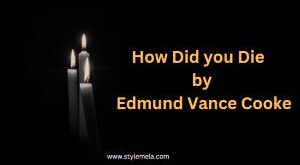Graveyard Poets: Exploring the Dark Beauty of Mortality
Graveyard poets are a group of writers from the 18th century who focused on themes of death, decay, and the afterlife. Their poetry often reflects a fascination with graveyards and the mysteries of life and death. This article will explore who the graveyard poets are, their key themes, and their impact on literature.
Characteristics of Graveyard Poetry:
- Meditations on Death: The poets focused on the inevitability of death, reflecting on the transient nature of human life and the certainty of death for all, rich or poor.
- Gothic Imagery: Though not explicitly Gothic writers, their use of graveyards, tombs, and other somber imagery paved the way for later Gothic literature.
- Philosophical Reflection: Their poems often expressed philosophical ideas about life, religion, and mortality, questioning the meaning of existence and what happens after death.
- Moral Lessons: Many of the poems carry moral undertones, reminding readers of the fleeting nature of worldly achievements and urging contemplation of the afterlife.
- Christian Influence: Their works were deeply influenced by Christian themes, with reflections on sin, salvation, and the hope of resurrection.
Who are the Graveyard Poets?
The Graveyard Poets, also known as the “Churchyard Poets,” were a group of pre-Romantic English writers in the 18th century who explored themes of mortality, melancholy, and the supernatural, often reflecting on life and death in a deeply personal, introspective way.
Their works were characterized by meditations on death, the brevity of life, and the mysteries of the afterlife, frequently set against the backdrop of desolate churchyards or graveyards.
They were part of the transition between the Augustan poetry of the early 18th century and the Romantic movement. Famous Gothic poets:
Thomas Gray:
- “Elegy Written in a Country Churchyard” (1751): This is perhaps the most famous example of Graveyard Poetry. Gray reflects on the unknown lives of common people buried in a rural graveyard, emphasizing the universality of death and the dignity of all human lives, regardless of social status. The poem contemplates the legacy we leave behind and the inevitability of being forgotten by history.
Edward Young:
- “Night Thoughts” (1742–1745): This long, philosophical poem is an extended meditation on death, human suffering, and divine justice. It presents the idea that death is a universal equalizer and reflects on the fleeting nature of worldly pursuits. Young’s work was also deeply influenced by his Christian beliefs, emphasizing the hope of salvation.
Robert Blair:
- “The Grave” (1743): Blair’s poem is a vivid reflection on death and the afterlife. He describes the physical decay of the body in the grave, but also suggests the possibility of resurrection and eternal life, in keeping with Christian theology. His detailed descriptions of death and burial are considered to be early examples of Gothic sensibilities.
James Hervey:
- “Meditations Among the Tombs” (1746–1747): In this prose work, Hervey meditates on the tombs of the deceased, considering the futility of wealth and fame in the face of death. He encourages the reader to reflect on their own mortality and the importance of preparing for the afterlife.
These poets used graveyards and death as symbols to explore deeper philosophical questions about life, existence, and what lies beyond.
Themes in Graveyard Poetry
Graveyard poets often focus on several common themes:
- Mortality: These poets frequently reflect on the inevitability of death. They remind readers that life is short and that everyone, regardless of status, will face death.
- Nature and Decay: Many poems describe the beauty of nature alongside the decay of life. Graveyards serve as a backdrop for exploring how nature reclaims the dead.
- The Afterlife: Graveyard poets ponder what happens after death. They often explore the idea of heaven, hell, and the unknown.
- Melancholy and Reflection: A sense of sadness runs through graveyard poetry. Poets reflect on their feelings of loss, nostalgia, and longing for those who have passed away.
The Influence of Graveyard Poets on Literature
Graveyard poets had a significant impact on the Romantic movement that followed. Their focus on emotion, nature, and the human condition influenced later poets like William Wordsworth and Samuel Taylor Coleridge.
The themes of death and introspection also resonated with Gothic literature, inspiring writers to explore the darker aspects of human experience.
Notable Works
- Elegy Written in a Country Churchyard by Thomas Gray: This poem reflects on the lives of ordinary people buried in a graveyard. It emphasizes the beauty of their simple lives and the common fate of death.
- Night Thoughts by Edward Young: A long poem that meditates on death, it encourages readers to consider their mortality and the nature of the afterlife.
- The Task by William Cowper: This poem explores themes of faith, nature, and mortality, highlighting the connection between human life and the divine.
Conclusion
Graveyard poets opened a door to deeper thoughts about life and death. Their focus on mortality, nature, and the afterlife gives readers a chance to reflect on their own lives. The legacy of graveyard poetry continues to influence literature today, reminding us of the beauty and inevitability of death.
Read More:
Gothic Poems: Exploring the Dark and Mysterious World of Gothic Poetry
